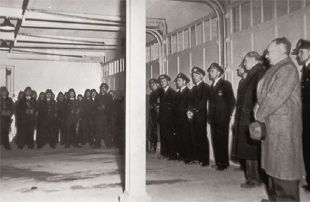Feeling hot, hot, hot! Flying in very warm weather
The summer holidays have begun and Schiphol is full of travellers flying to holiday destinations all over the world. But the Netherlands often has plenty of summer sun too. While Amsterdam’s climate cannot be compared to that of Alicante or Agadir, we do have heatwaves from time to time. But what impact does hot weather have on the airport and on flying? Does Schiphol have to take any specific measures when it’s baking hot outside? Keep on reading to find out!
Keeping the asphalt cool
Schiphol’s taxiways and runways are made of asphalt. And when it’s hot outside, you can be sure that the asphalt is even hotter. We monitor the temperature of the taxiways and runways using sensors on the asphalt. It can get up to a sizzling 50 degrees on the hottest days! And when asphalt gets hot, it also becomes softer. To prevent heavy aircraft from damaging the soft asphalt, we spray the asphalt with water. We focus on so-called hot spots (areas where planes make sharp turns) on the taxiways. This is usually done using large water tanks that are towed along by tractors. Take a look at the video below to see them in action!
Flying in extreme heat
As part of their certification, aircraft must go through various tests to ensure that they are safe to fly. This includes flying the aircraft in extremely warm temperatures. However, hot air does make it harder for planes to fly. Here comes the science bit… Heat causes molecules in the air to spread out and so the air becomes thinner. Thinner air means it takes more power to create the lift that allows a plane to take off. More fuel, more ground speed and more metres of runway are therefore required to lift the same amount of passengers and cargo under hot conditions. Airports in very hot countries sometimes need to impose weight restrictions when temperatures are extreme in order for planes to be able to take off successfully. This is not an issue at Schiphol though – it doesn’t get that hot in Holland and our runways are sufficiently long.
Climate change
Climate change is having an increasingly significant impact on our world, and the aviation sector is no exception. It is predicted that in the future more and more airports will have to introduce weight restrictions due to high temperatures. This is not likely to be necessary in the Netherlands though. Nonetheless, Schiphol is aware of the consequences of climate change and of aviation’s role in it. Royal Schiphol Group wants to operate the world’s most sustainable airports. We are committed to reducing CO2 emissions and strive to be emission-free by 2030.
Read the previous blogs
-
75 years of the Schiphol Fire Brigade
Published on:Where firefighting at Schiphol once involved little more than a sandpit and a few hand pumps, today a professional organisation is on hand 24/7 to keep us safe.

-
Is a filled bottle allowed through security?
Published on:You’re flying from Schiphol and have arrived at airport security check with a filled bottle. But what about those liquids again? Can you take it with you?

-
Holiday packing list
Published on:What do you take with you on holiday and on the plane? With this baggage checklist, you'll know for sure what's allowed in your suitcase and your hand baggage.
